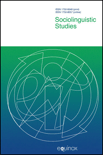
Sociolinguistic Studies
Scope & Guideline
Unraveling the Tapestry of Language and Identity
Introduction
Aims and Scopes
- Language Policy and Planning:
The journal emphasizes research on language policy and planning, exploring how policies impact language use within communities, particularly in multilingual and multicultural contexts. - Minority and Heritage Languages:
Sociolinguistic Studies addresses the challenges and strategies related to minority and heritage languages, examining how families and communities maintain linguistic diversity. - Multilingualism and Transnationalism:
The journal investigates multilingual practices in various contexts, including digital environments, and how these practices contribute to transnational identities and cultural exchanges. - Gender and Language:
Research on the intersections of gender and language is a significant focus, exploring how language reflects and shapes gender identities and social dynamics. - Linguistic Landscapes:
The journal includes studies on linguistic landscapes, analyzing public signage and its implications for language use, identity, and social interaction in urban settings. - Interdisciplinary Approaches:
Sociolinguistic Studies encourages interdisciplinary methodologies, integrating perspectives from anthropology, sociology, education, and applied linguistics to enrich sociolinguistic research.
Trending and Emerging
- Family Language Policy:
There is a growing interest in family language policy, particularly how families navigate multilingualism and language maintenance in diaspora communities. - Digital Communication and Multilingualism:
The impact of digital communication on multilingual practices has emerged as a significant theme, highlighting how technology influences language use and identity. - Intersectionality in Language Studies:
Research exploring the intersectionality of language, gender, and sexuality is gaining prominence, reflecting broader societal discussions about identity and representation. - Linguistic Landscapes in Global Contexts:
The study of linguistic landscapes is increasingly relevant, particularly in urban settings, as researchers examine how public spaces reflect linguistic diversity and social dynamics. - Language and Social Justice:
There is a rising trend in examining language from a social justice perspective, focusing on issues of inequality, discrimination, and the role of language in advocating for marginalized communities.
Declining or Waning
- Traditional Language Teaching Methods:
Research related to traditional language teaching methodologies has decreased, possibly due to a shift towards more innovative and technology-driven pedagogical approaches. - Monolingual Contexts:
There is a noticeable reduction in studies focusing solely on monolingual contexts, as the journal's emphasis has shifted towards multilingualism and its complexities. - Language Endangerment Studies:
Although still relevant, the frequency of publications specifically addressing language endangerment has waned, as the journal explores broader themes of language maintenance and revitalization. - Static Language Attitudes:
Research examining static attitudes towards languages, without considering the dynamic socio-political contexts, has decreased, indicating a movement towards more nuanced studies. - Historical Linguistic Analysis:
The focus on historical linguistic analysis has diminished, as the journal has increasingly prioritized contemporary sociolinguistic issues and their implications for society.
Similar Journals
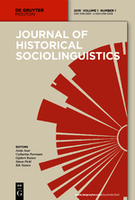
Journal of Historical Sociolinguistics
Unraveling the Threads of Language and SocietyThe Journal of Historical Sociolinguistics is a distinguished publication focusing on the intricate relationships between language and society from a historical perspective. Published by WALTER DE GRUYTER GMBH in Germany, this journal (ISSN: 2199-2894, E-ISSN: 2199-2908) is recognized for its rigorous scholarship, ranking in the Q2 quartile in Linguistics and Language (2023), highlighting its relevance and impact within the academic community. With Scopus rankings placing it at #326/1088 in Arts and Humanities and #386/1167 in Social Sciences, this journal is essential for researchers and scholars interested in the dynamics of language evolution, sociolinguistic shifts, and historical context. Through its insightful articles and contributions, the journal aims to illuminate the nuanced interplay between linguistic change and social factors over time, making it an invaluable resource for students, professionals, and academics alike. The journal operates under an open-access model, ensuring that knowledge is disseminated widely and freely accessible to those engaged in the cutting-edge studies of sociolinguistics.
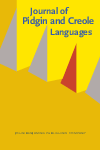
JOURNAL OF PIDGIN AND CREOLE LANGUAGES
Exploring the Rich Tapestry of Language EvolutionJOURNAL OF PIDGIN AND CREOLE LANGUAGES, published by John Benjamins Publishing Co, is a leading international journal dedicated to the study of pidgin and creole languages, offering a unique platform for interdisciplinary research within the fields of linguistics and language studies. With an impressive impact factor reflected in its 2023 Scopus rankings—placing it in the Q2 category for both Linguistics and Language—this journal has established itself as an essential resource for academics and practitioners alike. Covering a broad temporal scope from 1986 to 2024, it promotes innovative research that advances the understanding of language evolution, socio-linguistics, and cultural dynamics. The journal’s focus on both theoretical and practical perspectives makes it particularly valuable for researchers, professionals, and students interested in the complexities of language and identity. Although it does not currently offer Open Access, its commitment to quality scholarship ensures that each issue presents cutting-edge research and critical insights into the world of pidgins and creoles.
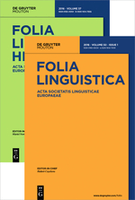
FOLIA LINGUISTICA
Connecting Scholars Through Language DiscoveryFOLIA LINGUISTICA, published by WALTER DE GRUYTER GMBH, is a premier scholarly journal dedicated to the field of linguistics. Established in 1967, the journal has consistently provided a platform for innovative research and scholarly discourse in language and linguistics, contributing significantly to the academic community's understanding of language structures, usage, and cognitive processes. With its classification in the top quartile (Q1) of linguistics and language in 2023, FOLIA LINGUISTICA holds a respectable rank (#282/1088) within the Arts and Humanities category and an admirable percentile rank of 74th, ensuring its position at the forefront of linguistic scholarship. Researchers and academics from around the globe can access a wealth of knowledge and cutting-edge research findings through this esteemed publication, which is vital for anyone looking to engage with the latest advancements in linguistics. Located in Berlin, Germany, FOLIA LINGUISTICA encompasses all aspects of language research, making it an indispensable resource for researchers, professionals, and students alike seeking to deepen their understanding of language and its complexities.

Slovo a Slovesnost
Empowering Linguistic Scholarship for a Global AudienceSlovo a Slovesnost is a prominent academic journal dedicated to the field of linguistics and language studies, published by the Czech Language Institute of the Czech Academy of Sciences. With an ISSN of 0037-7031, the journal has established itself as a significant resource for researchers and professionals within the linguistic community. Its rigorous selection process and impactful contributions have earned it a commendable Q2 ranking in Linguistics and Language as of 2023, as well as Scopus rankings in the 58th percentile for Language and Linguistics. Offering insights into both theoretical and applied linguistics, Slovo a Slovesnost serves as an essential platform for cutting-edge research, fostering dialogue among scholars, and enriching the study of language within the Czech Republic and beyond. Although it does not provide open access, the journal supports a subscription model that ensures high-quality dissemination of knowledge to a dedicated audience of linguists, educators, and linguistic scholars. With coverage converging from 2004 to 2024, it continues to thrive as a vital corner of linguistic scholarship.

Revista Argentina de Historiografia Linguistica
Uncovering the threads of linguistic history.Revista Argentina de Historiografia Linguistica, an esteemed academic journal based in Argentina, is dedicated to advancing the field of linguistic historiography. Published by the REVISTA ARGENTINA HISTORIOGRAFIA LINGUISTICA-RAHL, this journal serves as a vital platform for researchers, professionals, and students interested in the study of language history and the evolution of linguistic thought. With a commitment to open access, it promotes widespread dissemination of knowledge, ensuring that valuable insights reach a global audience. The journal aims to publish high-quality, peer-reviewed articles that explore various dimensions of linguistics, including historical language development, sociolinguistics, and language policy. By engaging with a diverse array of topics and methodologies, Revista Argentina de Historiografia Linguistica not only enhances academic discourse within the linguistics community but also fosters interdisciplinary collaboration, making it indispensable for those seeking to deepen their understanding of linguistic heritage and its contemporary significance.
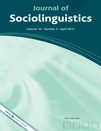
JOURNAL OF SOCIOLINGUISTICS
Exploring the Nexus of Language and SocietyThe Journal of Sociolinguistics, published by Wiley in the United Kingdom, is a leading interdisciplinary journal that explores the intricate relationships between language and society. With an impressive impact factor reflecting its Q1 quartile ranking in Histories and Philosophy of Science, Linguistics, Philosophy, and Sociology, this journal is recognized for its scholarly contributions, making it a vital resource for academics and practitioners in these dynamic fields. Covering a wide scope of topics from language variation and change to sociocultural dynamics, the journal has converged from 2004 to 2024, ensuring a comprehensive understanding of contemporary sociolinguistic issues. Although operating under a traditional access model, the Journal of Sociolinguistics remains pivotal for advancing critical dialogue and research for professionals, researchers, and students invested in linguistic and sociological studies.
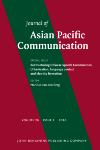
Journal of Asian Pacific Communication
Exploring the nuances of communication in the Asian Pacific.The Journal of Asian Pacific Communication, published by John Benjamins Publishing Co, stands out as a vital resource for researchers and professionals exploring the intricate dynamics of communication within the Asian Pacific region. Established in 2000, this esteemed journal, with the ISSN 0957-6851 and E-ISSN 1569-9838, focuses on interdisciplinary studies that intersect with the fields of business, communication, economics, and geography, as indicated by its Q3 ranking in multiple categories for 2023. The journal facilitates scholarly discourse, making it crucial for understanding regional communication practices and their broader implications. While the journal is not Open Access, it remains a critical source of knowledge for academics, offering comprehensive insights and empirical research that can inform practice and policy. In a rapidly evolving global context, the Journal of Asian Pacific Communication is dedicated to advancing the understanding of communication complexities unique to the Asian Pacific, ensuring its pivotal role in ongoing academic discussions.
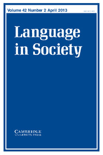
LANGUAGE IN SOCIETY
Unraveling the Ties Between Language and IdentityLANGUAGE IN SOCIETY, published by Cambridge University Press, is a leading interdisciplinary journal that explores the intricate relationship between language and social factors. With an impressive track record since its inception in 1972, this journal has become a critical resource for researchers and practitioners in the fields of linguistics, sociology, and political science, as evidenced by its high ranking in both the Q1 quartile and Scopus percentile rankings. In 2023, it was placed within the top 94th percentile among its peers in language and linguistics and the 93rd percentile in sociology. Furthermore, LANGUAGE IN SOCIETY provides an insightful platform for understanding language as both a social practice and a key element of identity and power dynamics. Although it does not currently offer Open Access options, its rigorous peer-reviewed content remains essential for advancing scholarship and informing professional practice in the study of language in diverse societal contexts. With its scholarly contributions, LANGUAGE IN SOCIETY continues to shape discourse and foster academic collaboration across disciplines.
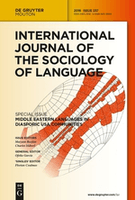
International Journal of the Sociology of Language
Navigating the Complexities of Language in Social SettingsInternational Journal of the Sociology of Language (ISSN: 0165-2516, E-ISSN: 1613-3668) is a premier academic journal published by WALTER DE GRUYTER GMBH in Germany, focusing on the intricate relationship between language and society. Since its establishment in 1974, this journal has continued to serve as a vital platform for disseminating high-quality research and theoretical discussions within the realms of linguistics and social sciences. Notably, it holds an impressive Q1 ranking in Linguistics and Language and maintains robust positions in Scopus rankings, being placed in the 84th and 83rd percentiles in the Arts and Humanities and Social Sciences categories, respectively. The journal not only emphasizes the socio-linguistic aspects of language use but also aims to foster interdisciplinary dialogue, making it indispensable for researchers, practitioners, and students pursuing an understanding of language within its social contexts. Although it is not an open-access publication, its rich content and scholarly contributions continue to have a significant impact within the field, making it a recommended read for anyone interested in the sociolinguistic landscape.
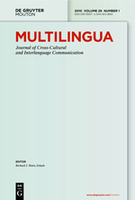
Multilingua-Journal of Cross-Cultural and Interlanguage Communication
Advancing Insights in Cross-Cultural InteractionsMultilingua: Journal of Cross-Cultural and Interlanguage Communication is a premier academic journal published by DE GRUYTER MOUTON, specializing in the dynamic fields of communication and linguistics. Established in 1982, this journal has significantly contributed to the discourse surrounding multilingualism, intercultural interactions, and language acquisition, with a notable reputation backed by an impressive Q1 ranking in both Communication and Linguistics and Language for 2023. Positioned strategically at the heart of Germany, the journal serves as a vital platform for researchers, professionals, and students alike, fostering scholarly exchange and insights into cross-cultural communication practices. With rankings placing it in the top percentiles across key categories in Scopus, including Arts and Humanities and Social Sciences, Multilingua exemplifies the highest standards of academic excellence. Although currently not an Open Access journal, it continues to provide a wealth of knowledge to the global research community.